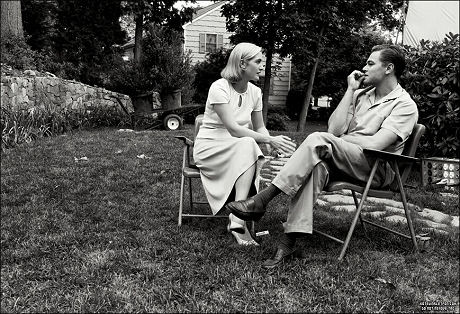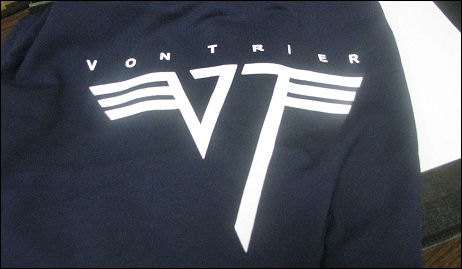Kim Voynar‘s Film Essent blog is now up at Movie City News. Kim hopes “to see many of you over there getting into some great discussions on film, politics, feminist issues and what-have-you.” (Somebody has to tell me what “essent” means, aside from being a re-imagined root of “essential”).
 Jeffrey Wells
Jeffrey Wells
Mean Beginning
It’s incredibly rare when a main-title sequence simultaneously (a) uses a very cool pop song, (b) is stylistically sharp and creative, (c) introduces the characters, (d) tells you a little bit about who the lead character is, and (e) manages to be smart and entertaining with exactly the right attitude (i.e., one that agrees with and expresses the milieu and spiritual world of the characters).
When’s the last time any film managed to do all these things in a single credit sequence? I’m not saying it hasn’t happened in the last ten or twenty years. I’m saying it’s not coming to me.
Gotham Film Award Picks
Lance Hammer‘s austere, somber, incontestably over-praised Ballast has snagged four nominations for the upcoming Gotham Independent Film Awards, which will be held 12.2 at Cipriani Wall Street. The snooty elites have embraced this low-key atmospheric mood piece since it played at Sundance ’08. I saw it there (i.e., at the Eccles) and went “uh-huh…okay…fine.”

Cipriani Wall Street
I’m not saying Ballast doesn’t deliver a nicely immersive sense of reality, or that it doesn’t deliver credible, first-rate art-film chops. I’m saying I don’t get the critics who’ve wet themselves after seeing it. Ballast never really got hold of me. It’s like a cross between an early Lars von Trier film and a Cristian Mungiu Romanian film (and that’s a good thing to see from an American filmmaker) but without the gathering intrigue. I kept saying to myself, “This is it? This is what Robert Koehler is doing cartwheels over?” As Armond White wrote, “It’s simply another calling-card movie establishing the director’s credentials.”
Here are the nominee GIF Award nominees and my pick about who (or what) should win:
BEST FEATURE: Ballast, Frozen River, Synecdoche, New York, The Visitor, The Wrestler. Suggested HE Winner: Tom McCarthy‘s The Visitor. Runner-up: The Wrestler.
BEST DOCUMENTARY: Chris & Don: A Love Story; Encounters at the End of the World, Man on Wire, Roman Polanski: Wanted and Desired, Trouble the Water. Suggested HE winner: James Marsh‘s Man on Wire. Runner-up: Roman Polanski: Wanted and Desired. Special HE Standout That Wasn’t Nominated But Should Have Been: Patti Smith: Dream of Life.

BEST ENSEMBLE PERFORMANCE: Ballast — Micheal J. Smith, Sr., JimMyron Ross, Tarra Riggs, Johnny McPhail; Rachel Getting Married — Anne Hathaway, Rosemarie DeWitt, Bill Irwin, Tunde Adebimpe, Mather Zickel, Anna Deavere Smith, Anisa George, Debra Winger ; Synecdoche, New York — Philip Seymour Hoffman, Samantha Morton, Michelle Williams, Catherine Keener, Emily Watson, Dianne Wiest, Jennifer Jason Leigh, Hope Davis, Tom Noonan; Vicky Cristina Barcelona — Scarlett Johansson, Rebecca Hall, Javier Bardem, Penelope Cruz; The Visitor — Richard Jenkins, Hiam Abbas, Haaz Sleiman, Danai Gurira. Suggested HE winner: If it’s finally a question of which ensemble cast seems the most grounded and penetrating without conspicuously “acting,” the winner has to to be The Visitor team. Runners-up: the Rachel Getting Married crew minus Tunde Adebimpe, who basically just stands around and smiles and good-vibes everyone.
BREAKTHROUGH DIRECTOR: Antonio Campos, Afterschool; Dennis Dortch, A Good Day to Be Black & Sexy, Lance Hammer, Ballast; Barry Jenkins, Medicine for Melancholy; Alex Rivera , Sleep Dealer. Suggested HE winner: What the hell, give it to Hammer. Runner-up: Alex Rivera.
BREAKTHROUGH ACTOR: Pedro Castaneda in August Evening; Rosemarie DeWitt in Rachel Getting Married; Rebecca Hall in Vicky Cristina Barcelona; Melissa Leo in Frozen River; Alejandro Polanco in Chop Shop; Micheal J. Smith, Sr. in Ballast. Suggested HE winner: Rosemarie DeWitt. (I love Melissa Leo’s work in Frozen River, but how is she a breakthrough type? She’s been around the track a few times.) Runner-up: Alex Rivera.
BEST FILM NOT PLAYING AT A THEATER NEAR YOU: Afterschool, Antonio Campos, director; Meadowlark, Taylor Greeson, producer/director; The New Year Parade, Tom Quinn, director; Sita Sings the Blues, Nina Paley, producer/director; Wellness, Jake Mahaffy. Suggested HE winner: No opinion.
Ballot
Libertarian, Republican, Green, American Independent, Peace and Freedom, Democratic. Why are they listed in this order? Why isn’t McCain-Palin at the very bottom instead of Obama-Biden? Who decides this? I wonder how many leftie votes will go to the combination of Cynthia McKinney and Ralph Nader?

Faraway

Visitor (okay, yours truly) in a sea of tall grass on the “front lawn” of a huge property in Tuscany, 10 or 15 kilometers north of Sienna on some smallish back road, taken late May of 2000.
Connnecticut Weltzschmerz
This photo of Kate Winslet and Leonardo DiCaprio (apparently) taking a break from Revolutionary Road filming is so crisp and beautiful that it makes me wish that the film itself had been shot in black-and-white. I’m very interested in seeing this Cheeveresque period drama, but I’d be 50% more cranked if the whole thing looked this way. Not as commercial, of course, but I’m a falling-down fool for monochrome.

Revolutionary Road costars Kate Winslet, Leonardo DiCaprio in a series of on-set photos posted by Alex Billington’s First Showing.net.
One of my journalistic dreams of the ’80s was to persuade a month magazine to let me write a column for them called “Hollywood Weltschmerz.” It was a fallback thing after my attempts to fund a monthly magazine called Nothing, a concept 10 to 15 years ahead of its time, led to nought.
Tension Nudge
“Between ‘Joe the Plumber’, ‘spread the wealth’ and ‘I’m not George Bush’, John McCain at least now seems to have a few somewhat more constructive talking points. So some of those crestfallen conservatives might have moved back into the likely voter universe. What I don’t know that McCain is doing, on the other hand, is actually persuading very many voters, and particularly not independents or registered Democrats.
“If that is the case, than McCain is likely to run into something of a wall very soon here, brought about [by] the Republicans’ substantial disadvantage in partisan identification.
“People sometimes misunderstand the nature of ‘momentum’ in presidential campaigns. If McCain was down 8 points yesterday and is down 6 points today, that does not mean that he is likely to be 4 points down tomorrow. On the contrary, polling in the general election seems essentially to be a random walk, with the minor stipulation that the polling has had some tendency to tighten slightly during the stretch run (as our model accounts for). That is, the polls are essentially as likely to move back toward Obama tomorrow as they are to continue to move toward McCain.
“McCain’s other problem is that the polls in battleground states have not really tightened at all. Obama gets good numbers today, for instance, in North Carolina, Wisconsin and Florida. Obama presently has something like a 3:1 advantage in advertising, and most of that advertising is concentrated in battleground states. As such, this may serve as a hedge against any improvements that McCain is able to make elsewhere in the country.” — Fivethirtyeight‘s Nate Silver, posted yesterday at 2:08 pm eastern.
Fallen
“It was a photo essay about troops who are serving in Iraq and Afghanistan. And one picture at the tail end of this photo essay was of a mother in Arlington Cemetery, and she had her head on the headstone of her son’s grave. And as the picture focused in, you could see the writing on the headstone. And it gave his awards — Purple Heart, Bronze Star — showed that he died in Iraq, gave his date of birth, date of death. He was 20 years old.

“And then, at the very top of the headstone, it didn’t have a Christian cross, it didn’t have the Star of David, it had crescent and a star of the Islamic faith. And his name was Kareem Rashad Sultan Khan, and he was an American. He was born in New Jersey. He was 14 years old at the time of 9/11, and he waited until he can go serve his country, and he gave his life. Now, we have got to stop polarizing ourself in this way.” — Colin Powell speaking on Meet The Press this morning, posted by Swampland‘s Karen Tumulty. Photo by Platon.
Scratch ‘n’ Sniff
Posted a couple of days ago by Awards Daily contributor Ryan Adams. I could scratch off one or two more but what’s the rush? It’s not even November.

Cut Above
W. is clearly a project that the restless, edgy Josh Brolin dived into wholeheartedly. Is he comfortable with the thought that his performance may make people like Dubya more? “I dunno if they’ll like him more, but I think they’ll struggle with the humanity of him as opposed to just pointing the finger. He is more likeable. That’s my point of view. But I think it allows your opinion of him to… (pause) I can see Republicans seeing this movie and saying, that’s why he’s so great. And I can see Democrats seeing this movie and saying, that’s why he’s a sociopath.” — from a Sunday, 10.19 interview with the Independent‘s Craig McLean.
$107 Million
“The average studio feature now costs $71 million to produce and $36 million to market, according to the Motion Picture Association of America, a 35 percent increase from the average at the start of the decade. In the world of independent films, costs are up even more — 83 percent during the same period.” — from Brooks Barnes‘ 10.18 N.Y. Times article about the degree of color-blindness in Hollywood decision-making about which films to green-light. It’s called “Race and the Safe Hollywood Bet.”


